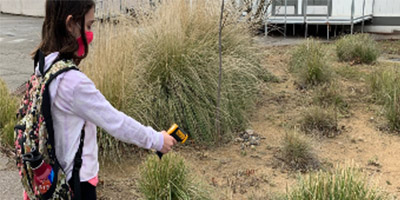
Parkview 5th-Graders Take 2nd Place in H2O Challenge
Students Design Water-Conserving Lawns for Their Winning Entry
 Fifth-grade students at Parkview Elementary in Chico, Calif., along with teacher Tammy Janos, took second place in the 2021 Cal Water H2O Challenge for researching and designing water-conserving lawns and sharing their findings with their community. They took home a $2,500 grant for the classroom and a Cal Water prize pack for each student.
Fifth-grade students at Parkview Elementary in Chico, Calif., along with teacher Tammy Janos, took second place in the 2021 Cal Water H2O Challenge for researching and designing water-conserving lawns and sharing their findings with their community. They took home a $2,500 grant for the classroom and a Cal Water prize pack for each student.
The Cal Water H2O Challenge (challenge.calwater.com) is a collaboration between Cal Water, the California Association of Science Educators (CASE), and DoGoodery. The free, project-based competition invites fourth-, fifth-, and sixth-grade classrooms in Cal Water service areas to develop and implement solutions for local water issues. During the pandemic, Cal Water evolved its model to help bring students a project-based learning opportunity, bearing in mind the limitations of distance learning. For the first time, students were able to focus on designing a water solution, in order to make the challenge more equitable and accessible amid coronavirus restrictions.
For their project, "Yard Design with Conservation Consciousness," students wanted to learn what the main source of home water consumption was. After discovering that the main source came from lawns, they decided to design and create lawn models that would inspire their community to choose water-conserving yards.
The students began their journey by conducting extensive research that included surveying their own household water use, learning about different types of yards, and experimenting on plants. After performing their research, the students measured their yards and calculated the water needed for a grass yard versus a low-water-use shrub yard with drip irrigation. They then surveyed yards in their neighborhoods and began designing and creating models of their yards.
In order to share their findings with their community, the students created a conservation newspaper and further spread their research through interactive games, speeches, and essays that were featured in their local newspaper.
According to Janos, the project has greatly impacted the students' lives. Although the competition is over, her students are motivated to continue this project and are working with their parents to alter their own yards to be more drought-friendly. "The educational benefit for students was more than the basic learning that went on. The real benefit was the deeper connection that they made between the content subject materials and real life. It allowed students to care about what they were learning so they could try and make a difference in the world," Janos said.
Janos added that the project gave students a deeper understanding of water conservation that will have lasting impacts, saying, "This project gave them motivation in a year where the opportunities were very limited. Also, through the integrated aspect of this work, students have developed the deeper kind of comprehension about water conservation that will hopefully develop into their personal framework for understanding world issues."
Despite the unprecedented challenges this year presented, by integrating water conservation, educational programs, and school curriculum, DoGoodery, CASE, and Cal Water's partnership transcended distance learning and provided a space to connect with students and bring STEM (Science Technology, Engineering, and Math) and NGSS (Next-Generation Science Standards) into the virtual classroom.
"Ms. Janos' fifth-grade students' determination to design water-conserving lawns demonstrates incredible tenacity and creativity," said Ken Jenkins, Cal Water's Director of Water Resource Sustainability. Regarding this year's competition as a whole, Jenkins said, "They also showed that our next generation's ability to discover and develop new solutions to water issues, even during difficult times, will help provide a better future for the communities we serve."
About CASE
The California Association of Science Educators (CASE) is a non-profit 501(c)(3) member-based community that works to lead the promotion of high-quality, equitable science education through advocacy, collaboration, and communication. Recognizing that science has a profound influence on our lives, our local environments, and our world. CASE fosters a community focused on enhancing scientific and environmental literacy and agency for all. For more information, visit cascience.org.
About DoGoodery
DoGoodery is a social impact agency with storytelling at the heart of its mission. DoGoodery collaborates with partners through all phases of social impact strategy building and storytelling, delivering goodness to audiences and clients alike and amplifying stories of change that empower, elevate, and excite. For more information visit www.dothegoodery.com.






